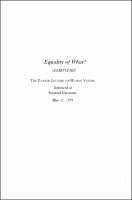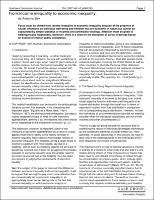Browsing by Author "Sen, Amartya"
Now showing items 1-2 of 2
-
Equality of What?
Sen, Amartya (Cambridge: Cambridge University Press., 1979)
Well-being is not just a question of the wealth or pleasure that a person has; it is a question of how people manage to live their lives and the ability they have to do certain things that are important to them. This was the argument put forward by Professor Amartya Sen in 1979. In his seminal Tanner Lecture – ‘Equality of What?’, Sen unites economics and philosophy to explore how a person’s well-being might best be measured. It was the first in a series of writings in which he developed his capability approach. This focuses on the actual capability ... -
From income inequality to economic inequality.
Sen, Amartya (Southern Economic Journal, 1997)
Focus must be shifted from income inequality to economic inequality because of the presence of causal influences on individual well-being and freedom that are economic in nature but cannot be expounded by simple statistics of incomes and commodity holdings. Attention must be given to heterogeneous magnitudes. Moreover, there is a need for the derivation of partial orderings based on explicit or implicit public acceptance.


